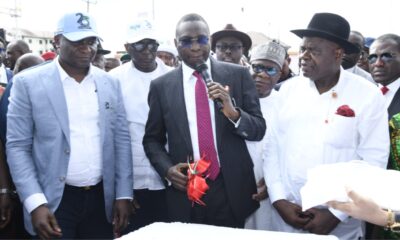Business
DPR Reveals Possible 3,000MW Generation From Gas Flare
Additional 3,000 megawatts of electricity can be generated from the current gas being flared in the country, a document from the Department of Petroleum Resources (DPR ) has revealed.
The reports that this is contained in DPR’s report made available at a workshop organised for energy journalists in Lagos on Friday.
The report says the country currently flares about 11 per cent of its gas production, bringing Nigeria to seventh in the world.
According to the report, if government is able to harness gas currently being flared at the 139 flare locations across the Niger Delta, it would boast of 3,000 MW of electricity in the nearest future.
It explained that solution to gas flaring challenge is for government to construct pipelines, which will harness all gas currently being flared into one position for commercialisation.
To this end, the report explained that government’s current Nigerian Gas Flare Commericlisation (NGFC) programme was geared towards finding markets for gas flared in the country.
According to the report, we made a mistake with the programme in the past because we allocated flare sites to companies without both technical and financial capacity to harness them.
“However, things have changed because DPR is now making sure those who got earlier allocations have everything it takes to take the gas into the market for sale,” it said.
The agency in the report added that government will be responsible for finding market for gas currently being flared unlike in the past when it was left in the hands of producers.
The report explained that another reason the programme has not been successful is because government left gas flaring commercialisation in the hands of the producers, who do not have much interest in gas.
The agency report says that gas flaring is a global challenge and it is categorised into two categories; routine flaring and non-routine flaring.
The report explains routine gas flaring as the intentional burning of gas, while non-routine flaring is the need to burn gas due to unexpected emergencies.
The Federal Government is planning to end routine gas flare by 2020.
“Non-routine flaring cannot be stopped because there is always emergencies, which could require companies to free up some pressure during production.
“Non-routine flaring doesn’t always happen,” the report said.
The report further said Nigeria needs dedicated exploration gas, as all the gas discovered in the country so far, have been “accidental”.
“ The country can generate double of the power produced today if we utilise the gas we flare, if Nigeria can harness its gas potential, we have the tendency to power Africa.”
Business
NPA Assures On Staff Welfare
Business
ANLCA Chieftain Emerges FELCBA’s VP
Business
NSC, Police Boost Partnership On Port Enforcement
-
Sports3 days ago
Ronaldo Renews Stay With Saudi Pro League
-

 Features3 days ago
Features3 days agoBetween EFCC And NDDC: Strategic Alliance For Niger Delta
-
Niger Delta3 days ago
EFCC Praises NDDC’S Performance … Unveils Projects In Bayelsa
-

 Politics3 days ago
Politics3 days agoMakinde Renames Polytechnic After Late Ex-Gov
-
Opinion3 days ago
Nigerian English As Nation-Building Tool
-
Nation3 days ago
TETFunds’ South Rep Visits CEAPOLY …Unveils Mass Communication Dept Building
-
Sports3 days ago
Spanish Football Fires Entire Refereeing Committee
-

 Niger Delta3 days ago
Niger Delta3 days agoOBALGA Sole Administrator Presents Brand New Fire Extinguishers To Council …Commiserates With Traders Over Rumuomasi Market Fire Incident …Commences Desilting Of Drainages

